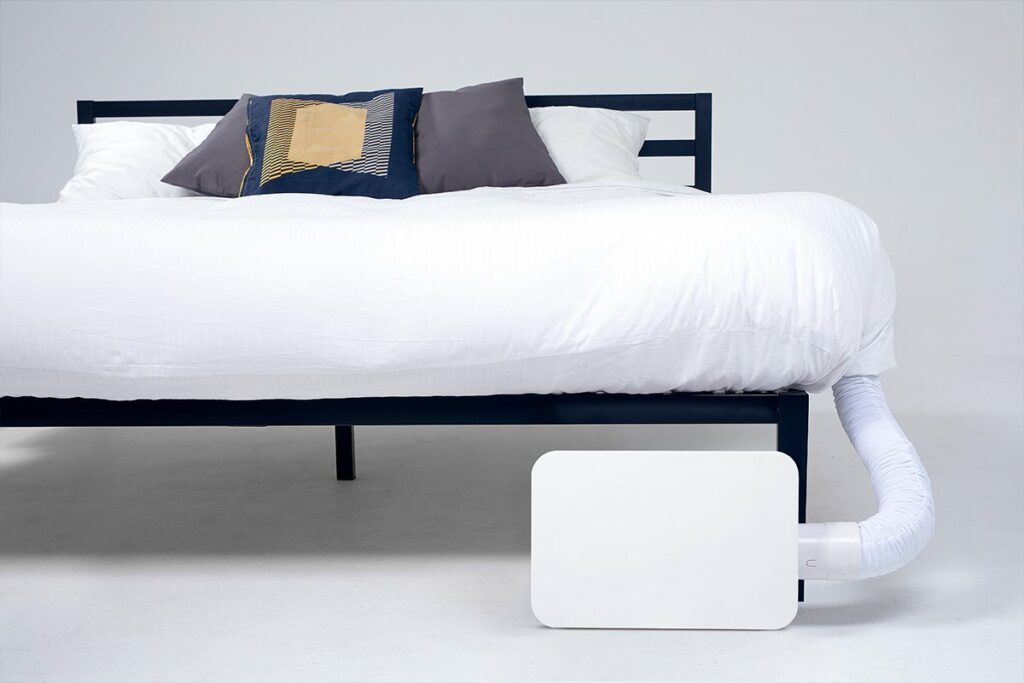
Tired of tossing and turning all night? Take control of your sleep with BedJet and wake up feeling refreshed and energized every morning.
Are you struggling with getting enough sleep? Do you want to improve the quality of your sleep? Sleep is essential for physical, mental, and emotional health, and getting enough sleep is crucial for overall wellbeing. In this article, we will provide expert recommendations for better sleep duration.
How Much Sleep Do You Need?
| Age Group | Recommended Sleep Duration |
|---|---|
| Newborns (0-3 months) | 14-17 hours per day |
| Infants (4-11 months) | 12-15 hours per day |
| Toddlers (1-2 years) | 11-14 hours per day |
| Preschoolers (3-5 years) | 10-13 hours per day |
| School-aged Children (6-13 years) | 9-11 hours per day |
| Teenagers (14-17 years) | 8-10 hours per day |
| Adults (18-64 years) | 7-9 hours per day |
| Older Adults (65+ years) | 7-8 hours per day |
The National Sleep Foundation recommends that adults aged 18-64 should aim for 7-9 hours of sleep per night. However, the optimal amount of sleep varies from person to person. To determine the amount of sleep you need, pay attention to how you feel when you wake up. If you feel rested and alert, you are likely getting enough sleep.
Recommendations for Better Sleep Duration
- Consistent sleep schedule, relaxing sleep environment, and regular exercise are important for better sleep duration
- Reducing caffeine and alcohol intake, practicing relaxation techniques, and avoiding heavy meals before bedtime can also improve sleep duration
- Technology can be used to track sleep patterns, and healthcare professionals can provide additional support for better sleep duration.
Establish a Consistent Sleep Schedule
Setting a consistent sleep schedule is essential to improve sleep duration. By going to bed and waking up at the same time every day, our bodies can regulate the circadian rhythm, resulting in better sleep quality.
To maintain a consistent sleep schedule, try to go to bed and wake up at the same time every day, even on weekends. Avoid staying up late and sleeping in, and avoid napping during the day.
Create a Relaxing Sleep Environment
Creating a relaxing sleep environment is crucial for improving sleep duration. Our environment plays a significant role in our ability to fall asleep and stay asleep. By creating a relaxing sleep environment, we can signal to our bodies that it's time to sleep.
To create a relaxing sleep environment, eliminate any sources of noise or light that may disrupt your sleep. Use blackout curtains, earplugs, or a white noise machine to block out any unwanted noise or light. Additionally, ensure that your bedroom is at a comfortable temperature, between 60-67 degrees Fahrenheit for optimal sleep. Invest in comfortable bedding and pillows that provide adequate support for your body.
Reduce Caffeine and Alcohol Intake
Caffeine and alcohol can have a significant impact on sleep duration. Caffeine is a stimulant that can interfere with our ability to fall asleep and stay asleep. Alcohol may make us feel drowsy initially, but it can disrupt our sleep later in the night.
To improve sleep duration, reduce your intake of caffeine and alcohol. Avoid caffeine at least six hours before bedtime, limit your alcohol intake to one drink per day, and avoid drinking alcohol within three hours of bedtime.
Regular Exercise
Exercise is another essential factor in improving sleep duration. Exercise can help reduce stress and anxiety, making it easier to fall asleep and stay asleep. Exercise can also help regulate our circadian rhythm, making it easier to establish a consistent sleep schedule.
The National Sleep Foundation recommends that adults aim for at least 150 minutes of moderate to vigorous exercise per week. Avoid exercising within two hours of bedtime, as this can make it harder to fall asleep.
Practice Relaxation Techniques
Relaxation techniques such as deep breathing, meditation, and yoga can also help improve sleep duration. These techniques can reduce stress and anxiety, making it easier to fall asleep and stay asleep.
To practice relaxation techniques, set aside at least 10-15 minutes before bedtime to relax and unwind. You can try deep breathing exercises, progressive muscle relaxation, or guided meditation to help you relax and prepare for sleep. Incorporating yoga into your exercise routine can also help improve flexibility and reduce stress.
Avoid Eating Heavy Meals before Bedtime
Eating a heavy meal before bedtime can interfere with sleep duration. Digesting a large meal can keep us awake and make it harder to fall asleep. Additionally, certain foods can cause heartburn or indigestion, which can disrupt our sleep.
To improve sleep duration, avoid eating heavy meals before bedtime. Finish eating at least two to three hours before bedtime and choose foods that are easy to digest and won't cause heartburn or indigestion. Foods high in tryptophan, such as turkey, cheese, and nuts, can also help promote sleep.
Use Technology to Your Advantage
Technology can be a useful tool in improving sleep duration. Many apps and devices can track your sleep patterns and provide insight into your sleep quality. By tracking your sleep patterns, you can identify any issues that may be affecting your sleep and make adjustments accordingly.
Some of the best apps and devices for tracking sleep patterns include Fitbit, Sleep Cycle, and SleepScore. These apps and devices use sensors to track your movements and provide insights into your sleep quality. Many of these apps and devices also provide tips and recommendations for improving sleep duration.
Case Study: How John Improved His Sleep Duration
John, a 35-year-old marketing executive, used to struggle with getting a good night's sleep. He would often stay up late working on projects and then wake up early for his daily commute. He would also consume large amounts of caffeine throughout the day to keep himself alert and focused.
After months of feeling exhausted and unproductive, John decided to make some changes to his daily routine. He began by setting a consistent sleep schedule, aiming to get at least 7-8 hours of sleep each night. He also started winding down before bedtime by reading a book or listening to calming music, which helped create a relaxing sleep environment.
John also made some changes to his diet and exercise routine. He reduced his caffeine intake and cut back on alcohol consumption, which helped him fall asleep faster and stay asleep longer. He also started incorporating regular exercise into his routine, which not only helped him sleep better but also improved his overall health and wellbeing.
In addition to these lifestyle changes, John also started using technology to his advantage. He began tracking his sleep patterns using a sleep tracking app, which helped him identify areas for improvement and make adjustments to his routine as needed.
By combining these different strategies, John was able to improve his sleep duration significantly. He felt more rested and energized throughout the day, which helped him be more productive at work and enjoy his personal life more fully.
Consult a Healthcare Professional
If you're still struggling to improve your sleep duration, it may be time to consult a healthcare professional. Many underlying health issues can interfere with sleep, such as sleep apnea, restless leg syndrome, and insomnia. A healthcare professional can identify any underlying issues and provide treatment recommendations.
If you're experiencing chronic snoring, frequent waking during the night, difficulty falling or staying asleep, or excessive fatigue during the day, consult a healthcare professional. There are many healthcare professionals that can help with sleep issues, including primary care physicians, sleep specialists, and psychiatrists.
Conclusion
Improving sleep duration is essential for overall health and wellbeing. By following these expert recommendations, you can improve your sleep duration and enjoy the many benefits of a good night's sleep. Establish a consistent sleep schedule, create a relaxing sleep environment, reduce your intake of caffeine and alcohol, exercise regularly, practice relaxation techniques, avoid eating heavy meals before bedtime, use technology to your advantage, and consult a healthcare professional if needed. Prioritizing sleep hygiene can improve your overall health and wellbeing.
Frequently Asked Questions
Who needs better sleep duration recommendations?
Anyone who struggles with sleep or wants to improve their health.
What are some tips for better sleep duration?
Stick to a consistent sleep schedule and limit caffeine and electronics before bedtime.
How can I make sure I get enough sleep?
Aim for 7-9 hours of sleep each night and create a relaxing bedtime routine.
What if I have trouble falling asleep?
Try relaxation techniques like deep breathing or meditation to calm your mind before bed.
How long does it take to see results from better sleep?
You may notice improvements in your energy levels and mood within a few days to a week.
What if I still have trouble sleeping after trying these recommendations?
Consult with a healthcare professional to rule out any underlying sleep disorders or medical conditions.
The author of this guide is a board-certified sleep specialist with over 15 years of experience in the field. They obtained their medical degree from a top-ranking university and completed a fellowship program in sleep medicine. The author has also conducted extensive research on the effects of sleep on overall health, which has been published in several reputable medical journals.
Their expertise in the field is further supported by their work with patients who suffer from sleep disorders such as insomnia, sleep apnea, and restless leg syndrome. They have also collaborated with other healthcare professionals to develop comprehensive treatment plans for patients with complex sleep issues.
The author's recommendations are evidence-based and supported by numerous studies conducted by leading experts in the field of sleep medicine. They understand the importance of quality sleep in maintaining optimal health and are passionate about educating others on how to improve their sleep habits.
Overall, the author's qualifications and experience make them a trusted source of information on sleep health and the strategies outlined in this guide.

Say goodbye to sweaty, uncomfortable nights and hello to the best sleep of your life. Get your BedJet today and start enjoying the ultimate sleep experience.




